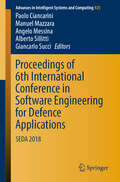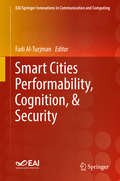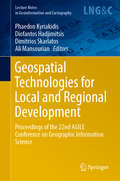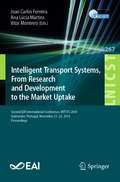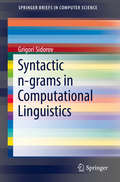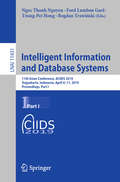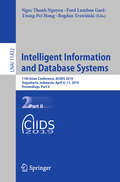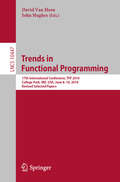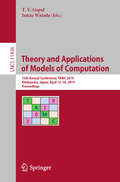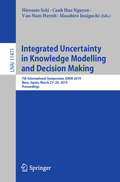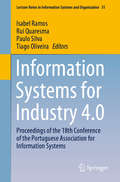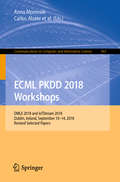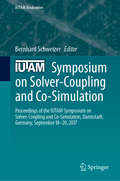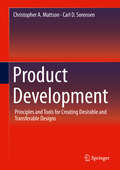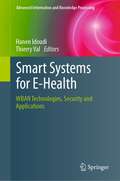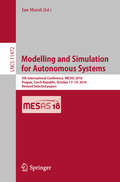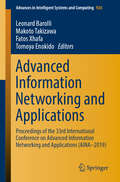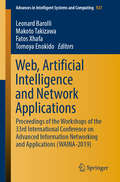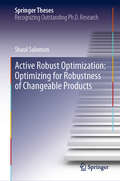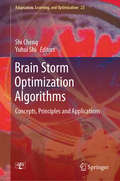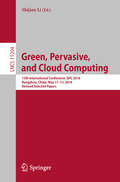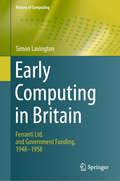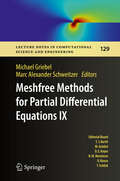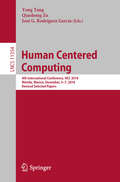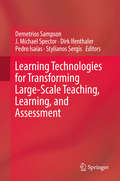- Table View
- List View
Proceedings of 6th International Conference in Software Engineering for Defence Applications: SEDA 2018 (Advances in Intelligent Systems and Computing #925)
by Paolo Ciancarini Manuel Mazzara Angelo Messina Alberto Sillitti Giancarlo SucciThis book presents high-quality original contributions on new software engineering models, approaches, methods, and tools and their evaluation in the context of defence and security applications. In addition, important business and economic aspects are discussed, with a particular focus on cost/benefit analysis, new business models, organizational evolution, and business intelligence systems. The contents are based on presentations delivered at SEDA 2018, the 6th International Conference in Software Engineering for Defence Applications, which was held in Rome, Italy, in June 2018. This conference series represents a targeted response to the growing need for research that reports and debates the practical implications of software engineering within the defence environment and also for software performance evaluation in real settings through controlled experiments as well as case and field studies. The book will appeal to all with an interest in modeling, managing, and implementing defence-related software development products and processes in a structured and supportable way.
Smart Cities Performability, Cognition, & Security (EAI/Springer Innovations in Communication and Computing)
by Fadi Al-TurjmanThis book provides knowledge into the intelligence and security areas of smart-city paradigms. It focuses on connected computing devices, mechanical and digital machines, objects, and/or people that are provided with unique identifiers. The authors discuss the ability to transmit data over a wireless network without requiring human-to-human or human-to-computer interaction via secure/intelligent methods. The authors also provide a strong foundation for researchers to advance further in the assessment domain of these topics in the IoT era. The aim of this book is hence to focus on both the design and implementation aspects of the intelligence and security approaches in smart city applications that are enabled and supported by the IoT paradigms. Presents research related to cognitive computing and secured telecommunication paradigms;Discusses development of intelligent outdoor monitoring systems via wireless sensing technologies;With contributions from researchers, scientists, engineers and practitioners in telecommunication and smart cities.
Geospatial Technologies for Local and Regional Development: Proceedings of the 22nd AGILE Conference on Geographic Information Science (Lecture Notes in Geoinformation and Cartography)
by Ali Mansourian Phaedon Kyriakidis Diofantos Hadjimitsis Dimitrios SkarlatosThis book includes the full research papers accepted by the scientific programme committee for the 22nd AGILE Conference on Geographic Information Science, held in June 2019 at Cyprus University of Technology, Limassol, Cyprus. It is intended primarily for professionals and researchers in geographic information science, as well as those in related fields in which geoinformation application plays a significant role.
Intelligent Transport Systems, From Research and Development to the Market Uptake: Second EAI International Conference, INTSYS 2018, Guimarães, Portugal, November 21–23, 2018, Proceedings (Lecture Notes of the Institute for Computer Sciences, Social Informatics and Telecommunications Engineering #267)
by Joao Carlos Ferreira Ana Lúcia Martins Vitor MonteiroThis book constitutes the proceedings of the Second EAI International Conference on Intelligent Transport Systems, INTSYS 2108, which was held in Guimarães, Portugal, in November 2018. The 11 revised full papers were selected from 16 submissions and are organized in four thematic sessions on parking and collaborative approaches, case studies and simulation, mobility and planning, and Future 5V.
Syntactic n-grams in Computational Linguistics (SpringerBriefs in Computer Science)
by Grigori SidorovThis book is about a new approach in the field of computational linguistics related to the idea of constructing n-grams in non-linear manner, while the traditional approach consists in using the data from the surface structure of texts, i.e., the linear structure.In this book, we propose and systematize the concept of syntactic n-grams, which allows using syntactic information within the automatic text processing methods related to classification or clustering. It is a very interesting example of application of linguistic information in the automatic (computational) methods. Roughly speaking, the suggestion is to follow syntactic trees and construct n-grams based on paths in these trees. There are several types of non-linear n-grams; future work should determine, which types of n-grams are more useful in which natural language processing (NLP) tasks. This book is intended for specialists in the field of computational linguistics. However, we made an effort to explain in a clear manner how to use n-grams; we provide a large number of examples, and therefore we believe that the book is also useful for graduate students who already have some previous background in the field.
Intelligent Information and Database Systems: 11th Asian Conference, ACIIDS 2019, Yogyakarta, Indonesia, April 8–11, 2019, Proceedings, Part I (Lecture Notes in Computer Science #11431)
by Ngoc Thanh Nguyen Ford Lumban Gaol Tzung-Pei Hong Bogdan TrawińskiThe two-volume set LNAI 11431 and 11432 constitutes the refereed proceedings of the 11th Asian Conference on Intelligent Information and Database Systems, ACIIDS 2019, held in Yogyakarta, Indonesia, in April 2019.The total of 124 full papers accepted for publication in these proceedings were carefully reviewed and selected from 309 submissions. The papers of the first volume are organized in the following topical sections: knowledge engineering and semantic web; text processing and information retrieval; machine learning and data mining; decision support and control systems; computer vision techniques; and databases and intelligent information systems. The papers of the second volume are divided into these topical sections: collective intelligence for service innovation, technology management, E-learning, and fuzzy intelligent systems; data structures modelling for knowledge representation; advanced data mining techniques and applications; intelligent information systems; intelligent methods and artificial intelligence for biomedical decision support systems; intelligent and contextual systems; intelligent systems and algorithms in information sciences; intelligent supply chains and e-commerce; sensor networks and Internet of Things; analysis of image, video, movements and brain intelligence in life sciences; and computer vision and intelligent systems.
Intelligent Information and Database Systems: 11th Asian Conference, ACIIDS 2019, Yogyakarta, Indonesia, April 8–11, 2019, Proceedings, Part II (Lecture Notes in Computer Science #11432)
by Ngoc Thanh Nguyen Ford Lumban Gaol Tzung-Pei Hong Bogdan TrawińskiThe two-volume set LNAI 11431 and 11432 constitutes the refereed proceedings of the 11th Asian Conference on Intelligent Information and Database Systems, ACIIDS 2019, held in Yogyakarta, Indonesia, in April 2019.The total of 124 full papers accepted for publication in these proceedings were carefully reviewed and selected from 309 submissions. The papers of the first volume are organized in the following topical sections: knowledge engineering and semantic web; text processing and information retrieval; machine learning and data mining; decision support and control systems; computer vision techniques; and databases and intelligent information systems. The papers of the second volume are divided into these topical sections: collective intelligence for service innovation, technology management, E-learning, and fuzzy intelligent systems; data structures modelling for knowledge representation; advanced data mining techniques and applications; intelligent information systems; intelligent methods and artificial intelligence for biomedical decision support systems; intelligent and contextual systems; intelligent systems and algorithms in information sciences; intelligent supply chains and e-commerce; sensor networks and Internet of Things; analysis of image, video, movements and brain intelligence in life sciences; and computer vision and intelligent systems.
Trends in Functional Programming: 17th International Conference, TFP 2016, College Park, MD, USA, June 8-10, 2016, Revised Selected Papers (Lecture Notes in Computer Science #10447)
by David Van Horn John HughesThis book constitutes the refereed proceedings of the 17th International Conference on Trends in Functional Programming, TFP 2016, held in College Park, USA, in June 2016.The 10 full papers presented in this volume were carefully reviewed and selected from 18 submissions. The papers were organized in topical sections named: implementation techniques; types and verification; and programming.
Theory and Applications of Models of Computation: 15th Annual Conference, TAMC 2019, Kitakyushu, Japan, April 13–16, 2019, Proceedings (Lecture Notes in Computer Science #11436)
by T. V. Gopal Junzo WatadaThis book constitutes the refereed proceedings of the 15th Annual Conference on Theory and Applications of Models of Computation, TAMC 2019, held in Kitakyushu, Japan, in April 2019. The 43 revised full papers were carefully reviewed and selected from 60 submissions. The main themes of the selected papers are computability, computer science logic, complexity, algorithms, models of computation, and systems theory.
Integrated Uncertainty in Knowledge Modelling and Decision Making: 7th International Symposium, IUKM 2019, Nara, Japan, March 27–29, 2019, Proceedings (Lecture Notes in Computer Science #11471)
by Hirosato Seki Canh Hao Nguyen Van-Nam Huynh Masahiro InuiguchiThis book constitutes the refereed proceedings of the 7th International Symposium on Integrated Uncertainty in Knowledge Modelling and Decision Making, IUKM 2019, held in Nara, Japan, in March 2019.The 37 revised full papers presented were carefully reviewed and selected from 93 submissions. The papers deal with all aspects of uncertainty modelling and management and are organized in topical sections on uncertainty management and decision support; econometrics; machine learning; machine learning applications; and statistical methods.
Information Systems for Industry 4.0: Proceedings of the 18th Conference of the Portuguese Association for Information Systems (Lecture Notes in Information Systems and Organisation #31)
by Isabel Ramos Rui Quaresma Paulo Silva Tiago OliveiraThis book provides a selection of the best papers presented at the 18th Conference of the Portuguese Association for Information Systems (CAPSI), which was held in 2018. The focus of the conference and of these proceedings lies on the interplay between information systems and Industry 4.0. All contributions, which include original research, review papers and case studies, were peer-reviewed in a double blind process.
ECML PKDD 2018 Workshops: DMLE 2018 and IoTStream 2018, Dublin, Ireland, September 10-14, 2018, Revised Selected Papers (Communications in Computer and Information Science #967)
by Anna Monreale Carlos Alzate Michael Kamp Yamuna Krishnamurthy Daniel Paurat Moamar Sayed-Mouchaweh Albert Bifet João Gama Rita P. RibeiroThis book constitutes revised selected papers from the workshops DMLE and IoTStream, held at the 18thEuropean Conference on Machine Learning and Knowledge Discovery in Databases, ECML PKDD 2018, in Dublin, Ireland, in September 2018. The 8 full papers presented in this volume were carefully reviewed and selected from a total of 12 submissions.The workshops included are:DMLE 2018: First Workshop on Decentralized Machine Learning at the EdgeIoTStream 2018: 3rd Workshop on IoT Large Scale Machine Learning from Data Streams
IUTAM Symposium on Solver-Coupling and Co-Simulation: Proceedings of the IUTAM Symposium on Solver-Coupling and Co-Simulation, Darmstadt, Germany, September 18-20, 2017 (IUTAM Bookseries #35)
by Bernhard SchweizerThis is the Proceedings of the IUTAM Symposium on Solver Coupling and Co-Simulation that was held in Darmstadt, Germany, September 18-20, 2017. The symposium focused on recent advances in the development of numerical methods for solver coupling, like new explicit, implicit and semi-implicit co-simulation methods, new approaches for realizing variable communication-time grids, and advances in the stability and convergence analysis of solver coupling methods.Recent developments in the practical application of co-simulation methods, for instance new fields of application for solver coupling approaches, new developments in the parallelization of dynamic models with co-simulation techniques, and standardization of co-simulation interfaces, i.e. standardization of data and model exchange were also discussed.The book brings together the research results of leading scientists in applied mathematics, mechanics, and engineering science, thus contributing to further develop numerical methods for coupled simulations.
Product Development: Principles and Tools for Creating Desirable and Transferable Designs
by Christopher A. Mattson Carl D. SorensenThis book explores the evolution of products from the beginning idea through mass-production. Rather than prescribing a one-size-fits-all process, the authors explain the theory behind product development and challenge readers to develop their own customized development process uniquely suited for their individual situation. In addition to theory, the book provides development case studies, exercises and self-evaluation criteria at the end of each chapter, and a product development reference that introduces a wide variety of design tools and methods. Class-tested for three consecutive years by hundreds of students in four different courses, the book is an ideal text for senior design classes in mechanical engineering and related disciplines as well as a reference for practicing engineers/product designers.
Smart Systems for E-Health: WBAN Technologies, Security and Applications (Advanced Information and Knowledge Processing)
by Hanen Idoudi Thierry ValThe purpose of this book is to review the recent advances in E-health technologies and applications. In particular, the book investigates the recent advancements in physical design of medical devices, signal processing and emergent wireless technologies for E-health. In a second part, novel security and privacy solutions for IoT-based E-health applications are presented. The last part of the book is focused on applications, data mining and data analytics for E-health using artificial intelligence and cloud infrastructure. E-health has been an evolving concept since its inception, due to the numerous technologies that can be adapted to offer new innovative and efficient E-health applications. Recently, with the tremendous advancement of wireless technologies, sensors and wearable devices and software technologies, new opportunities have arisen and transformed the E-health field. Moreover, with the expansion of the Internet of Things, and the huge amount of data that connected E-health devices and applications are generating, it is also mandatory to address new challenges related to the data management, applications management and their security. Through this book, readers will be introduced to all these concepts. This book is intended for all practitioners (industrial and academic) interested in widening their knowledge in wireless communications and embedded technologies applied to E-health, cloud computing, artificial intelligence and big data for E-health applications and security issues in E-health.
Modelling and Simulation for Autonomous Systems: 5th International Conference, MESAS 2018, Prague, Czech Republic, October 17–19, 2018, Revised Selected papers (Lecture Notes in Computer Science #11472)
by Jan MazalThis book constitutes the thoroughly refereed post-workshop proceedings of the 5th International Workshop on Modelling and Simulation for Autonomous Systems, MESAS 2018, held in Prague, Czech Republic, in October 2018. The 46 revised full papers included in the volume were carefully reviewed and selected from 66 submissions. They are organized in the following topical sections: Future Challenges of Advanced M&S Technology; Swarming - R&D and Application; M&S of Intelligent Systems - AI, R&D and Application; AxS in Context of Future Warfare and Security Environment (Concepts, Applications, Training, Interoperability, etc.).
Advanced Information Networking and Applications: Proceedings of the 33rd International Conference on Advanced Information Networking and Applications (AINA-2019) (Advances in Intelligent Systems and Computing #926)
by Leonard Barolli Makoto Takizawa Fatos Xhafa Tomoya EnokidoThe aim of the book is to provide latest research findings, innovative research results, methods and development techniques from both theoretical and practical perspectives related to the emerging areas of information networking and applications. Networks of today are going through a rapid evolution and there are many emerging areas of information networking and their applications. Heterogeneous networking supported by recent technological advances in low power wireless communications along with silicon integration of various functionalities such as sensing, communications, intelligence and actuations are emerging as a critically important disruptive computer class based on a new platform, networking structure and interface that enable novel, low cost and high volume applications. Several of such applications have been difficult to realize because of many interconnections problems. To fulfill their large range of applications different kinds of networks need to collaborate and wired and next generation wireless systems should be integrated in order to develop high performance computing solutions to problems arising from the complexities of these networks. This book covers the theory, design and applications of computer networks, distributed computing and information systems.
Web, Artificial Intelligence and Network Applications: Proceedings of the Workshops of the 33rd International Conference on Advanced Information Networking and Applications (WAINA-2019) (Advances in Intelligent Systems and Computing #927)
by Leonard Barolli Makoto Takizawa Fatos Xhafa Tomoya EnokidoThe aim of the book is to provide latest research findings, innovative research results, methods and development techniques from both theoretical and practical perspectives related to the emerging areas of Web Computing, Intelligent Systems and Internet Computing. As the Web has become a major source of information, techniques and methodologies that extract quality information are of paramount importance for many Web and Internet applications. Data mining and knowledge discovery play key roles in many of today’s prominent Web applications such as e-commerce and computer security. Moreover, the outcome of Web services delivers a new platform for enabling service-oriented systems. The emergence of large scale distributed computing paradigms, such as Cloud Computing and Mobile Computing Systems, has opened many opportunities for collaboration services, which are at the core of any Information System. Artificial Intelligence (AI) is an area of computer science that build intelligent systems and algorithms that work and react like humans. The AI techniques and computational intelligence are powerful tools for learning, adaptation, reasoning and planning. They have the potential to become enabling technologies for the future intelligent networks. Recent research in the field of intelligent systems, robotics, neuroscience, artificial intelligence and cognitive sciences are very important for the future development and innovation of Web and Internet applications.
Active Robust Optimization: Optimizing for Robustness of Changeable Products (Springer Theses)
by Shaul SalomonThis book presents a novel framework, known as Active Robust Optimization, which provides the tools for evaluating, comparing and optimizing changeable products. Since any product that can change its configuration during normal operation may be considered a “changeable product,” the framework is widely applicable. Further, the methodology enables designers to use adaptability to deal with uncertainties and so avoid over-conservative designs. Offering a comprehensive overview of the framework, including its unique features, such as its ability to optimally respond to uncertain situations, the book also defines a new class of optimization problem and examines the effects of changes in various parameters on their solution. Lastly, it discusses innovative approaches for solving the problem and demonstrates these with two examples from different fields in engineering design: optimization of an optical table and optimization of a gearbox.
Brain Storm Optimization Algorithms: Concepts, Principles and Applications (Adaptation, Learning, and Optimization #23)
by Shi Cheng Yuhui ShiBrain Storm Optimization (BSO) algorithms are a new kind of swarm intelligence method, which is based on the collective behavior of human beings, i.e., on the brainstorming process. Since the introduction of BSO algorithms in 2011, many studies on them have been conducted. They not only offer an optimization method, but could also be viewed as a framework of optimization techniques. The process employed in the algorithms could be simplified as a framework with two basic operations: the converging operation and the diverging operation. A “good enough” optimum could be obtained through recursive solution divergence and convergence. The resulting optimization algorithm would naturally have the capability of both convergence and divergence.This book is primarily intended for researchers, engineers, and graduate students with an interest in BSO algorithms and their applications. The chapters cover various aspects of BSO algorithms, and collectively provide broad insights into what these algorithms have to offer. The book is ideally suited as a graduate-level textbook, whereby students may be tasked with the study of the rich variants of BSO algorithms that involves a hands-on implementation to demonstrate the utility and applicability of BSO algorithms in solving optimization problems.
Green, Pervasive, and Cloud Computing: 13th International Conference, GPC 2018, Hangzhou, China, May 11-13, 2018, Revised Selected Papers (Lecture Notes in Computer Science #11204)
by Shijian LiThis book constitutes the proceedings of the 13th International Conference on Green, Pervasive, and Cloud Computing, GPC 2018, held in Hangzhou, China, in May 2018.The 35 full papers included in this volume were carefully reviewed and selected from 101 initial submissions. They are organized in the following topical sections: network security, and privacy-preserving; pervasive sensing and analysis; cloud computing, mobile computing, and crowd sensing; social and urban computing; parallel and distributed systems, optimization; pervasive applications; and data mining and knowledge mining.
Early Computing in Britain: Ferranti Ltd. and Government Funding, 1948 — 1958 (History of Computing)
by Simon LavingtonThis unique book presents the story of the pioneering manufacturing company Ferranti Ltd. – producer of the first commercially-available computers – and of the nine end-user organisations who purchased these machines with government help in the period 1951 to 1957. The text presents personal reminiscences from many of the diverse engineers, programmers and marketing staff who contributed to this important episode in the emergence of modern computers, further illustrated by numerous historical photographs. Considerable technical details are also supplied in the appendices.Topics and features: provides the historical background to the Ferranti Mark I, including the contributions of von Neumann and Turing, and the prototype known as The Baby; describes the transfer of technologies from academia to industry and the establishment of Ferranti’s computer production resources; reviews Ferranti’s efforts to adapt their computers for sale to business and commercial markets, and to introduce competitive new products; covers the use of early Ferranti computers for defence applications in different government establishments in the UK, including GCHQ Cheltenham; discusses the installation and applications of Ferranti computers at universities in the UK, Canada, and Italy; presents the story of the purchase of a Ferranti Mark I* machine by the Amsterdam Laboratories of the Shell company; details the use of Ferranti Mark I* computers in the UK’s aerospace industry and compares this with the American scene; relates the saga of Ferranti’s journey from its initial success as the first and largest British computer manufacturer to its decline and eventual bankruptcy.This highly readable text/reference will greatly appeal to professionals interested in the practical development of early computers, as well as to specialists in computer history seeking technical material not readily available elsewhere. The educated general reader will also find much to enjoy in the photographs and personal anecdotes that provide an accessible insight into the early days of computing.
Meshfree Methods for Partial Differential Equations IX (Lecture Notes in Computational Science and Engineering #129)
by Michael Griebel Marc Alexander SchweitzerThis volume collects selected papers presented at the Ninth International Workshop on Meshfree Methods held in Bonn, Germany in September 2017. They address various aspects of this very active research field and cover topics from applied mathematics, physics and engineering.The numerical treatment of partial differential equations with meshfree discretization techniques has been a very active research area in recent years. While the fundamental theory of meshfree methods has been developed and considerable advances of the various methods have been made, many challenges in the mathematical analysis and practical implementation of meshfree methods remain.This symposium aims to promote collaboration among engineers, mathematicians, and computer scientists and industrial researchers to address the development, mathematical analysis, and application of meshfree and particle methods especially to multiscale phenomena. It continues the 2-year-cycled Workshops on Meshfree Methods for Partial Differential Equations.
Human Centered Computing: 4th International Conference, HCC 2018, Mérida, Mexico, December, 5–7, 2018, Revised Selected Papers (Lecture Notes in Computer Science #11354)
by Yong Tang Qiaohong Zu José G. Rodríguez GarcíaThis book constitutes thoroughly reviewed, revised and selected papers from the 4th International Conference on Human Centered Computing, HCC 2018, held in Merida, Mexico, in December 2018. The 50 full and 18 short papers presented in this volume were carefully reviewed and selected from a total of 146 submissions. They focus on a "hyper-connected world", dealing with new developments in artificial intelligence, deep learning, brain-computing, etc.
Learning Technologies for Transforming Large-Scale Teaching, Learning, and Assessment
by Dirk Ifenthaler J. Michael Spector Pedro Isaías Demetrios Sampson Stylianos SergisThis volume provides a contemporary glance at the drastically expanding field of delivering large-scale education to unprecedented numbers of learners. It compiles papers presented at the CELDA (Cognition and Exploratory Learning in the Digital Age) conference, which has a goal of continuing to address these challenges and promote the effective use of new tools and technologies to support teaching, learning and assessment. Given the emerging global trend to exploit the potential of existing digital technologies to improve the teaching, learning and assessment experiences for all learners in real-life contexts, this topic is a unifying theme for this volume.The book showcases how emerging educational technologies and innovative practices have been used to address core global educational challenges. It provides state-of-the-art insights and case studies of exploiting innovative learning technologies, including Massive Open Online Courses and educational data analytics, to address key global challenges spanning from online Teacher Education to large-scale coding competence development. This volume will be of interest to academics and professional practitioners working in the area of digital technology integration in teaching, learning and assessment, as well as those interested in specific conference themes (e.g., designing and assessing learning in online environments, assessing learning in complex domains) and presenters, invited speakers, and participants of the CELDA conference.
